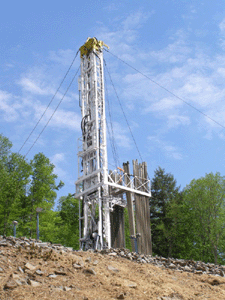Cabot Oil and Gas Corp
From Wikimarcellus
Cabot Oil and Gas Corp. (NYSE: COG) is an oil and gas exploration and production company headquartered in Houston, Texas. Better than 95% of its reserves and production are in natural gas. The company operates 3,200 miles of pipeline and 4 Bcf of natural gas storage capacity in its East Region.
Cabot's Marcellus shale production has focused on rural Susquehanna County, Pennsylvania. The company announced in October, 2009 that its total northeast Pennsylvania leasehold consisted of 170,000 acres. By then, 17 horizontal wells had been drilled during 2009, and the company was producing 50 Mmcf per day from the Marcellus shale. The Marcellus formation is at one of its thickest points in Susquehanna County.

Cabot Teel well site, Susquehanna Co., PA
- Photo credit - Marcellus Shale in Pennsylvania - Gas Well Locations
Contents |
Latest Operating Results
According to its third quarter, 2009 operational update, released in October, 2009, during the year Cabot had drilled 17 horizontal Marcellus wells and 16 more were either still drilling or waiting to be drilled. As of that time, it had fielded 6 horizontal rigs in the Marcellus play. Five had been larger fit-for-purpose rigs. In the company's view, these rigs had been instrumental in helping reduce its drilling time by better than 50% and costs by 35%. The update noted that all of Cabot's horizontal wells had been averaging 7 Mmcf/d for their initial 30 days of production. The Teel 8H well came online June 11, 2009, and from it alone, the company expected that by approximately the middle of August to have produced over 1/2 Bcf of natural gas. Cabot continued to ramp up its pipeline gathering system and compression facilities with capacity expected to grow from the current 110 Mmcf/d to 275 by the summer of 2010.
Cabot planned to double its Marcellus shale drilling program during 2010 with 73 horizontal and 10 vertical wells slated for drilling.
2008 Development Timeline
During the fall of 2008, Cabot began to ramp up activities in Susquehanna County. As of September, a dozen well pads had been set up along state Route 3023, the road that winds through Dimock and Springville south of Montrose, Pennsylvania. The company reportedly held permits for drilling 18 more wells there. The development is referred to locally as The Dimock Project. By September, 2008, the company was reported to be actively drilling in Susquehanna County.
Water issues
Cabot paid a fine to the Susquehanna River Basin Commission of $375,000 for not complying with limits on water withdrawal for wells in Dimock and Springville townships.
Various leasing and drilling activities
An October, 2008 report indicated Cabot had the following activity in the Marcellus shale:
- 4 rigs in operation
- 14 wells drilled
- 6 wells producing
A November, 2008 report stated that both Cabot and Chesapeake Energy were actively leasing drilling rights in Wayne County, Pennsylvania, although so far there had been virtually no drilling activity in the County.
An early December, 2008 report indicated Cabot had recently drilled its first horizontal Marcellus test well in West Virginia. It had a depth of 8,925 feet and a horizontal segment at 2,000 feet with a six-stage frac. The initial flow rate was 6.4 million cubic feet per day.
Year's end and transition into spring of 2009
The company had a number of other Marcellus wells underway by year-end 2008 that were in various stages of completion. According to an operational update provided in February, 2009, Cabot's Marcellus production as of December 31, 2008 had been almost 20 Mmcf/d. By April, 2009 it was reporting 34 Mmcf per day.
2009 Development Timeline
2009 was a year of great drilling successes in the Marcellus, yet it was also one in which environmental concerns over Cabot's Dimock operation started to attract significant negative publicity.
Various drilling activities
A report in March, 2009 stated that Cabot had drilled 30 wells in Dimock since 2006, 20 of them during 2008, and 8 were horizontal. It owned just over 160,000 acres in the Marcellus play.
In April, 2009 the company provided an update with these results from its horizontal wells at The Dimock Project:
Initial Average Number Type of Well Type Mmcf/d Mmcf/d of days frac Ely 6H horizontal 6.4 4.3 105 Black 1H " 8.8 8.0 60 Black 1H " 8.3 4.1 60 4 stage Heitzman #1H " 9.0 8.8 5 4 " Source: Cabot Oil & Gas Update, April, 2009
A different April report indicated all four wells had used slickwater fracs. Cabot had been using 20-40 sand, pumping them for approximately 60,000 minutes.
Cabot also had 13 vertical Marcellus wells. It already had compression and dehydration capabilities. These facilities were in the process of being improved, and the company expected to have the capacity to process 85-90 Mmcf/d by June, 2009. The same report indicated that Cabot had drilled 28 wells to date in Pennsylvania, and eight were horizontal ones. As of April, 2009 it was drilling three horizontal and three vertical wells, and had 6 rigs drilling in the State.
The 183 acre Ken Ely farm in Dimock Twp. had been the site of six of the wells.
The challenges at Dimock
Dimock was in the news in January, 2009 when a natural gas explosion was reported on the Norma Fiorentino farm on Route 2024, A later January report indicated methane had been found in water wells in four residences along Carter Road. A hydro-geologist had been hired by the company to investigate how gas could have migrated through the supply from a nearby gas well site.
There had been much concern about the contamination of drinking water wells on the farms in the Dimock area, and problems there had become a public relations issue during 2009 for the entire gas exploration and production industry. Since the Marcellus shale play was still at the beginning stages of development, the Dimock water well-contamination publicity had become something of a poster child for public, watchdog group and regulator anxieties over environmental hazards of further drilling in the play.
Cabot had also been reported active in Sullivan County, New York where there is a reservoir that contributes to New York City's drinking water supply.
Opens North Region Office in Pittsburgh
In May, 2009, Cabot announced that it was closing down its Charleston, West Virginia eastern regional office and relocating to the Pittsburgh, Pennsylvania area. The new facility was to be called the North Region office and was scheduled to open in September, 2009. The company cited efficiency as the main reason for the change. However, the move seems quite consistent with targeting the Marcellus shale formation, and Cabot's involvement in developing the Marcellus in northeastern Pennsylvania--especially in Susquehanna County.
The prolific Teel wells
In July, 2009 the company announced completion of a very prolific horizontal well, the Teel 8H, which had a 30-day flow rate of 9.8 Mmcf/d. A vertical well on the same farm, the Teel #6 had initial production of 4.2Mmcf/d. The company's total Marcellus production was 39 Mmcf per day contributed by 7 horizontal and 20 vertical wells. In the past year the company's cumulative Marcellus production had been 5.8 Bcf. The company planned to spud 18 more horizontal wells before the end of 2009. 3 had been in the process of being completed, and 10 more awaited pipeline hookup. It had a compression facility with 100 Mmcf/d capacity at the Teel location, although only 70 Mmcf/d of that capacity was to be utilized until the summer of 2010.
Frac fluid leak in Dimock
Cabot was again in the news in September, 2009 when there had been two accidental releases of frac fluid at Dimock amounting to 7980 gallons in total. The leaked fluid consisted in part of volatile organic compounds (VOCs) named LGC-35. It had leaked from the Heitsman #4H well off Route 29 near Dimock, Pennsylvania in Susquehanna County and flowed into a wetland that contributes to the headwaters of Stevens Creek. VOCs come from the petroleum distillation process, and are used as a lubricating agent in hydro-fracturing gas wells.
At first PDEP had ordered Cabot to cease all hydro-fracturing in Susquehanna County and cited Cabot for the spills, yet less than one month later it approved the restart of Cabot's hydro-fracturing activities in the county. The company had complied with the terms of the original order by submitting a safety plan and an engineering study.
Spotlight Issues
- Cabot's history at the Dimock project has been one of tremendous drilling successes as well as dogged criticism over frac fluid leaks and water pollution issues.
- The company has been using its fit-for-purpose rigs to great advantage to optimize drilling efficiency and plans to use them even more in the future.
- At Dimock, it has been achieving outstanding production from both its vertical and horizontal wells. The vertical wells appear to be accessing virtually all of the Marcellus formation. Cabot's horizontal Marcellus wells have had initial 30 day rates ranging between 3.5 and 10.9 Mmcf/d.
- The company planned to essentially double its drilling program in the Marcellus shale during 2010.
Executive contacts
- Cabot's Chairman, President and CEO is Dan O. Dinges.
- Michael B. (Mike) Walen is Senior Vice President and COO.
- Scott C. Schroeder is Vice President and the company's CFO.
- Jeffrey W. Hutton is Cabot's Vice President, Marketing
- Ken Komoroski is spokesman for Cabot and also an attorney from Pittsburgh.
- Phil Stalnake heads up Cabot's new North Region office.


